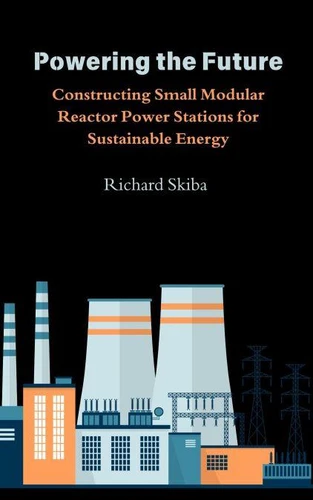Powering the Future: Constructing Small Modular Reactor Power Stations for Sustainable Energy
Par :Formats :
Disponible dans votre compte client Decitre ou Furet du Nord dès validation de votre commande. Le format ePub est :
- Compatible avec une lecture sur My Vivlio (smartphone, tablette, ordinateur)
- Compatible avec une lecture sur liseuses Vivlio
- Pour les liseuses autres que Vivlio, vous devez utiliser le logiciel Adobe Digital Edition. Non compatible avec la lecture sur les liseuses Kindle, Remarkable et Sony
 , qui est-ce ?
, qui est-ce ?Notre partenaire de plateforme de lecture numérique où vous retrouverez l'ensemble de vos ebooks gratuitement
Pour en savoir plus sur nos ebooks, consultez notre aide en ligne ici
- FormatePub
- ISBN978-1-7637696-9-4
- EAN9781763769694
- Date de parution17/11/2024
- Protection num.pas de protection
- Infos supplémentairesepub
- ÉditeurRichard Skiba
Résumé
This book serves as an in-depth exploration of Small Modular Reactors (SMRs) and their transformative potential in the modern energy landscape. It is designed to provide a thorough understanding of SMRs, from their technological foundations to their practical applications in power generation. Beginning with an overview of the evolution of nuclear technology, it delves into the unique benefits that SMRs offer over traditional nuclear reactors, such as enhanced safety features, modular construction, and cost-efficiency.
Readers are guided through critical aspects of SMR projects, including site selection, design principles, and engineering challenges, as well as the regulatory and licensing processes required to deploy these reactors. Detailed chapters address the construction, integration, and operational phases of SMR power stations, with an emphasis on modular assembly techniques, quality control, and workforce development.
The book also tackles the economic dimensions of SMRs, offering insights into cost-benefit analyses, funding models, and projected returns on investment. It presents a balanced view of the financial risks involved and proposes strategies to mitigate them. The environmental impact of SMRs is explored in detail, highlighting their low carbon footprint, waste management strategies, and potential for integrating with renewable energy sources to create sustainable energy systems.
This book is ideal for energy professionals, engineers, policy makers, and investors interested in the future of nuclear technology. It would also appeal to academics and students in fields related to nuclear engineering, energy policy, and sustainable development. The comprehensive coverage of SMRs' technical, economic, and environmental aspects makes it a valuable resource for anyone looking to understand the role of SMRs in achieving global energy security and decarbonization goals.
Readers are guided through critical aspects of SMR projects, including site selection, design principles, and engineering challenges, as well as the regulatory and licensing processes required to deploy these reactors. Detailed chapters address the construction, integration, and operational phases of SMR power stations, with an emphasis on modular assembly techniques, quality control, and workforce development.
The book also tackles the economic dimensions of SMRs, offering insights into cost-benefit analyses, funding models, and projected returns on investment. It presents a balanced view of the financial risks involved and proposes strategies to mitigate them. The environmental impact of SMRs is explored in detail, highlighting their low carbon footprint, waste management strategies, and potential for integrating with renewable energy sources to create sustainable energy systems.
This book is ideal for energy professionals, engineers, policy makers, and investors interested in the future of nuclear technology. It would also appeal to academics and students in fields related to nuclear engineering, energy policy, and sustainable development. The comprehensive coverage of SMRs' technical, economic, and environmental aspects makes it a valuable resource for anyone looking to understand the role of SMRs in achieving global energy security and decarbonization goals.
This book serves as an in-depth exploration of Small Modular Reactors (SMRs) and their transformative potential in the modern energy landscape. It is designed to provide a thorough understanding of SMRs, from their technological foundations to their practical applications in power generation. Beginning with an overview of the evolution of nuclear technology, it delves into the unique benefits that SMRs offer over traditional nuclear reactors, such as enhanced safety features, modular construction, and cost-efficiency.
Readers are guided through critical aspects of SMR projects, including site selection, design principles, and engineering challenges, as well as the regulatory and licensing processes required to deploy these reactors. Detailed chapters address the construction, integration, and operational phases of SMR power stations, with an emphasis on modular assembly techniques, quality control, and workforce development.
The book also tackles the economic dimensions of SMRs, offering insights into cost-benefit analyses, funding models, and projected returns on investment. It presents a balanced view of the financial risks involved and proposes strategies to mitigate them. The environmental impact of SMRs is explored in detail, highlighting their low carbon footprint, waste management strategies, and potential for integrating with renewable energy sources to create sustainable energy systems.
This book is ideal for energy professionals, engineers, policy makers, and investors interested in the future of nuclear technology. It would also appeal to academics and students in fields related to nuclear engineering, energy policy, and sustainable development. The comprehensive coverage of SMRs' technical, economic, and environmental aspects makes it a valuable resource for anyone looking to understand the role of SMRs in achieving global energy security and decarbonization goals.
Readers are guided through critical aspects of SMR projects, including site selection, design principles, and engineering challenges, as well as the regulatory and licensing processes required to deploy these reactors. Detailed chapters address the construction, integration, and operational phases of SMR power stations, with an emphasis on modular assembly techniques, quality control, and workforce development.
The book also tackles the economic dimensions of SMRs, offering insights into cost-benefit analyses, funding models, and projected returns on investment. It presents a balanced view of the financial risks involved and proposes strategies to mitigate them. The environmental impact of SMRs is explored in detail, highlighting their low carbon footprint, waste management strategies, and potential for integrating with renewable energy sources to create sustainable energy systems.
This book is ideal for energy professionals, engineers, policy makers, and investors interested in the future of nuclear technology. It would also appeal to academics and students in fields related to nuclear engineering, energy policy, and sustainable development. The comprehensive coverage of SMRs' technical, economic, and environmental aspects makes it a valuable resource for anyone looking to understand the role of SMRs in achieving global energy security and decarbonization goals.






















